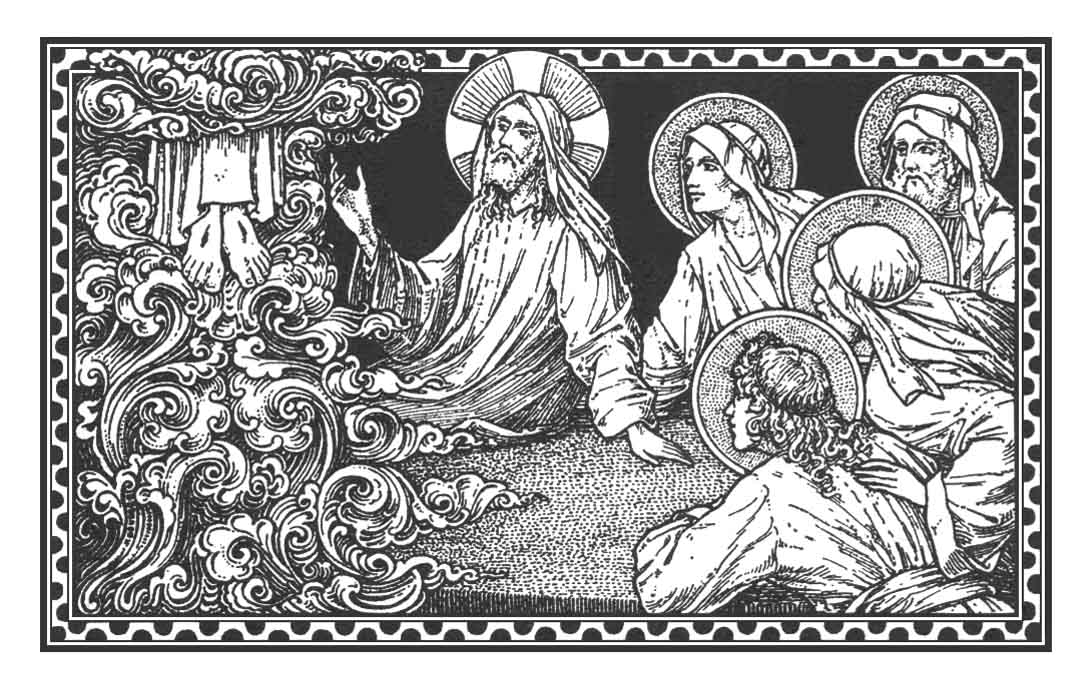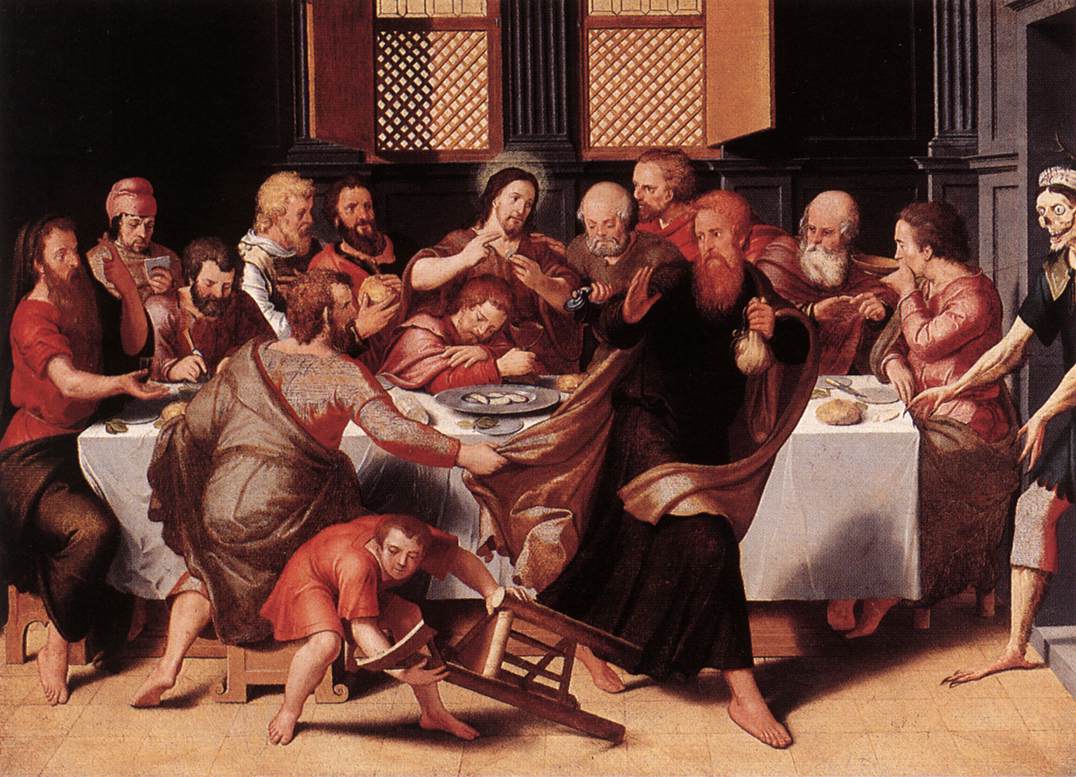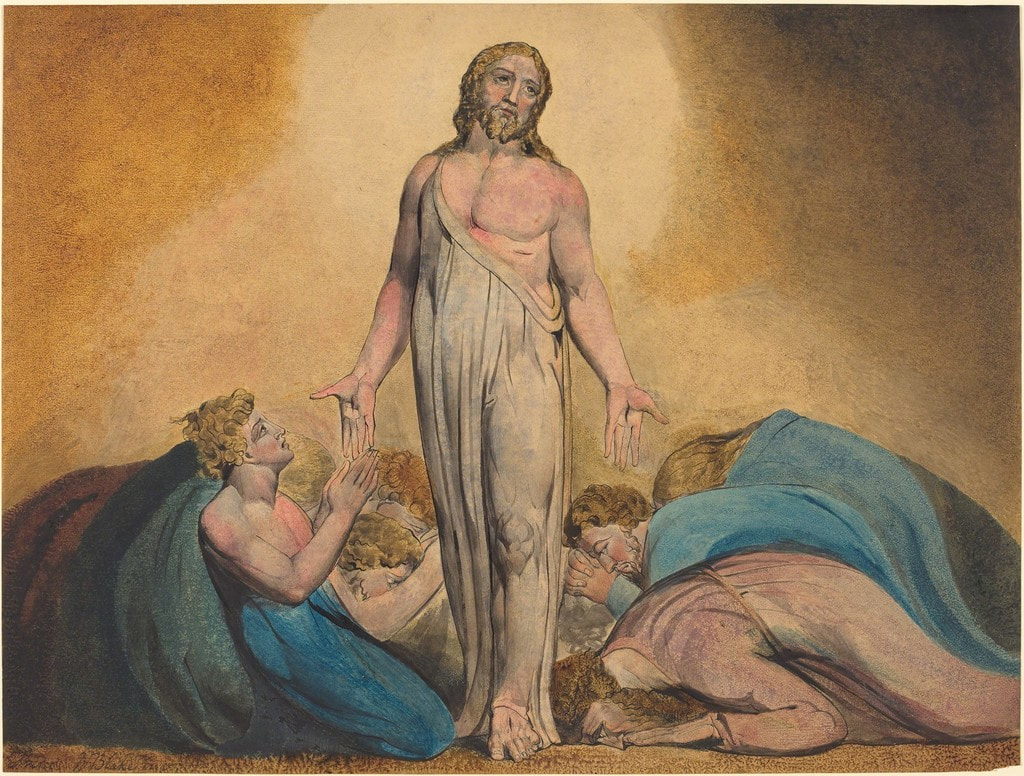April 29, 2018
Children don't know what's best for them. It's true. They will often even argue with their parents to avoid doing things that are good for them. But parents generally know better than their kids about what's good for them. And this, in a far more superlative way, is the relationship between God and us. God knows what is good for us much better than we do.
Jesus' disciples are sorrowful, because Jesus is going to leave them. But he informs them that this is actually good for them, because if he does not leave them, the Helper will not come to them. The Helper, also known as the Comforter, Spirit of Truth, and Holy Spirit comes to us for our own benefit. If you are to be a Christian, you want the Holy Spirit to come to you.
When Jesus says that he is going to the Father, he's not saying he's going to take a long road trip. No, Jesus' path to the Father is through suffering and death on the cross. He will return to his Father risen from the dead with nail printed hands and feet and a pierced side, proof of his labor on our behalf.
So, why is to our advantage to receive the Holy Spirit, if the cost to receive him is Jesus' gruesome death upon the cross? Because, the Holy Spirit is sent by Christ to deliver to you all that Jesus has earned for you through his suffering and death: forgiveness, righteousness, and eternal life. If Jesus does not suffer for your sins, the Holy Spirit has nothing to deliver to you. And if the Holy Spirit does not give to you what is Christ's, then you will die in your sins.
The Holy Spirit preaches. And in his preaching, he convicts, that is, he exposes the world concerning sin, righteousness, and judgment. Concerning sin, because they do not believe in Jesus. Unbelief is the root of all sin. The reason people disobey their parents, murder, cheat, steal, and lie, is because of a lack of faith in God. Unbelief causes one to disregard God's command, judgment, and providence. And in light of Jesus' crucifixion on the cross, which paid the punishment for all sin, unbelief becomes the only sin, as Jesus says in John 3:18, "Whoever believes in him is not condemned, but whoever does not believe is condemned already, because he has not believed in the name of the only Son of God." Therefore, the Holy Spirit exposes the world of their sin by exposing them of their unbelief and rejection of Christ.
The Holy Spirit convicts the world of righteousness, because Jesus goes to the Father. That is, the Holy Spirit declares the world righteous, because Jesus suffered and died for the sins of the world. Now, wait a minute. I thought the Holy Spirit convicted the world of sin. How can the Holy Spirit then declare the world righteous? Because the Holy Spirit must first convict the world of sin, before he can declare them righteous by God. This is what St. Paul says in Galatians chapter 3, "But the Scripture imprisoned everyone under sin, so that the promise by faith in Jesus Christ might be given to those who believe." (vs 22) and again in Romans 11, "For God has consigned all to disobedience, that he may have mercy on all." The Holy Spirit convicts everyone of sin, so that he might have mercy on them all by declaring forgiveness won by Christ.
The Holy Spirit convicts all people of sin. There is no person, who is not under the condemnation of sin, because all people are sinners. Yet, Jesus died for the sins of all people. Therefore, there is not a single person, whose sins have not been forgiven by the merits of Jesus' death and resurrection. This is why the Holy Spirit convicts all people of sin, so that they can see their need for forgiveness. This is called preaching the law. This is also why the Holy Spirit convicts everyone of righteousness, by proclaiming that Jesus has taken your sins away. This is called preaching the Gospel. When people believe that their sins are forgiven, they are believing in an objective fact. Christ has earned forgiveness for everyone. Only lack of faith stands between a sinner and justification before God.
Finally, the Holy Spirit convicts the world of judgment, because the ruler of this world is judged. The ruler of this world is Satan. His sole endeavor is to destroy Jesus' sheep and cause them to go to hell. He attempts to lead them into sin by enticing us sinners with our own sinful desires. And he accuses us of our transgressions before God himself. But now that Christ has gone to the Father by the path of his suffering and death, our adversary has been silenced, cast down, and condemned. He's judged once and for all. God's judgment is final. We are justified by the blood of Jesus. Satan's schemes have failed. This final judgment and imprisonment of the devil will take place on the Last Day, yet the Holy Spirit comforts us with this fact even now.
All this is to our benefit! It is good for us that Jesus went away and that he sends the Holy Spirit to us. Had Christ not paid our ransom, we would be trapped in sin. And had he not sent the Holy Spirit to us, we would be without faith and would not receive the victory from him.
Yet, an important question remains. How does the Holy Spirit do this? Where do we find the Holy Spirit's work? And this is a very frustrating thing. Because, although Jesus tells us that it is to our benefit that he send us the Holy Spirit, many, like stubborn children, refuse to believe Jesus that it is to their benefit to receive the Holy Spirit. Yet, there are many others, who, recognize that they need the Holy Spirit, yet seek him in all the wrong places. They seek the Holy Spirit by trying to speak in tongues or prophecy or through miraculous healings. Yet, it is not only Pentecostals and other charismatic groups that seek the Holy Spirit in these ways. Even Lutherans try to get a personal relationship with Jesus and contact with the Holy Spirit in completely unbiblical ways. They think they can get in touch with the Holy Spirit while in the deer stand or by meditating on their own thoughts.
So, how do you receive the Holy Spirit? How does he come to you? Through his word! St. Peter says, "Knowing this first of all, that no prophecy comes from someone's own interpretation. For no prophecy was ever produced by the will of man, but men spoke from God as they were carried along by the Holy Spirit." (2 Peter 1:20-21) The Holy Spirit speaks through Scripture. This also means that the Holy Spirit speaks through the preaching of the Gospel. On the night of his resurrection, Jesus breathed on his disciples and said, "Receive the Holy Spirit," before he charged them with forgiving the sins of repentant sinners. And after Jesus sent his Holy Spirit upon his disciples on Pentecost, they began to preach the Gospel.
The Holy Spirit also works through the Sacraments, because the Sacraments depend on God's Word. St. Peter says, "Repent and be baptized every one of you in the name of Jesus Christ for the forgiveness of your sins, and you will receive the gift of the Holy Spirit." (Acts 2:38) And St. Paul calls Baptism a washing of rebirth and renewal in the Holy Spirit. (Titus 3:5)
So, you know from Jesus words that it is to your benefit that he send the Holy Spirit. And you should also know that the Holy Spirit comes to you through the ministry of preaching the Gospel and the administration of the Sacraments. Wherever God's Word is preached and read, there the Holy Spirit convicts the world of sin, righteousness, and judgment. And there the he takes what belongs to Christ, his righteousness, sonship, and kingdom, and he declares it to you through faith.
This Sunday is named Cantate Sunday. Cantate is Latin for sing! which from our Introit from Psalm 98 we sang, "Sing to the LORD a new song!" And, so it is important to note the work of the Holy Spirit in the music of the Church. The Church has always sung in its worship. Both our Psalm and Old Testament Lesson speak of singing to the Lord. The Psalms were composed to be sung, and many of them make reference to musical instruments and singing. Jesus sang a hymn as he went out to the Garden of Gethsemane to begin his passion. And St. Paul instructs us to "address one another in psalms and hymns and spiritual songs, singing and making melody to the Lord with your heart." (Ephesians 5:19) Singing in Church is biblical and the Holy Spirit works through it.
There are two main reasons the Church sings, besides the fact that we have always sung: To glorify God and to teach the faith. The reason why the congregation chants portions of the liturgy is the same reason the pastor sings portions of the liturgy. It isn't to entertain. It is to offer our first-fruits to God and give him glory. This is also why we sing hymns. They give glory to God. We could save a lot of time and have a much shorter service if we just spoke everything. But we take the time to sing, because we want to offer God something beautiful and show that our worship of him is important to us.
Singing also helps teach. When you put words to a tune, the words are easier to impress upon the heart. This can be used for both good and evil. The heretic Arius, who denied that Jesus is God and whose false teachings lead to the Church constructing the Nicene Creed, popularized his false teaching through catchy songs. And I'm sure parents in this congregation are very concerned with the music popular today, which glorifies fornication, disobedience, and drug use. Just think of the Lady Gaga song, "Born this Way," which taught children that homosexuality is something you are born with and therefore is good. Even if the first claim were true, we know that just because you are born a certain way doesn't mean it is good. We confess every week that we are born poor miserable sinners. Nevertheless, that song and many others have taught millions of youth to accept sinful behavior as good. And if you think the music your children listen to won't have an effect on their opinions, you are mistaken.
Yet, music can also be used for great good. Singing is an excellent teaching tool. One of my greatest joys as a father is listening to my children sing portions of the liturgy and hymns that they've learned in Church, which confess their faith in their Savior Jesus. The hymns we sing in Church teach the faith. Pay attention to them as you sing them! They will instruct you in the way of truth and strengthen your faith in Christ. In these hymns, the Holy Spirit takes what is Christ's and gives it to you!
This is also why it is important to sing hymns at home, especially with your children! Listening to "Christian Music" on the radio isn't good enough. Much of the music, as we know, is mostly fluff, which appeals to emotion more than biblical truth. And much of it is even false doctrine, which teaches you contrary to what you were taught in your Small Catechism! The difference between the hymns we sing in Church, many of which were passed on to us from our fathers in the faith from generations past and much of the popular Christian music today is the difference between a well-balanced meal and Halloween candy! Just compare our hymn of the day, "Dear Christians, One and All Rejoice," with what is at the top of the Christian Music charts today. That hymn has fed countless Christians for nearly 500 years a well-balanced meal of Christ and everything that the Holy Spirit delivers to us sinners to make us whole.
If music doesn't teach the faith, it doesn't give glory to God. Jesus says that the Holy Spirit will glorify him by taking what is his and giving it to us. The Holy Spirit does this, when he teaches us what is Christ's, his death and resurrection, forgiveness and Sacraments. When hymns teach the faith, they glorify Christ. When they do not teach Christ, they do not glorify him.
I encourage you to learn hymns by heart and to teach them to your children at home. Not just any hymns, but good hymns, which teach the faith. Hymns, which teach Jesus are powerful enough to fend off Satan. When even a 35 pound child sings, "Satan, here this proclamation, I am baptized into Christ," the ruler of this world flees with his tail between his leg. I've been hearing my daughter sing by heart the first stanza of our hymn of the month, "Christ Jesus Lay in Death's Strong Bands." Every time she sings this hymn, she confesses the saving faith. My prayer is that she will find comfort in this hymn and hymns like it even on her death bed.
Sing hymns that teach the Gospel of Jesus. Sing the liturgy, which pleases the ears of God. Don't make the excuse that you can't sing or carry a tune. God doesn't listen to your pitch, but to your faith. Notice how the Holy Spirit is at work in the hymns, which confess Jesus' work of salvation for you. God knows such hymns are good for you. O, sing to the Lord a new song! Amen.



 RSS Feed
RSS Feed